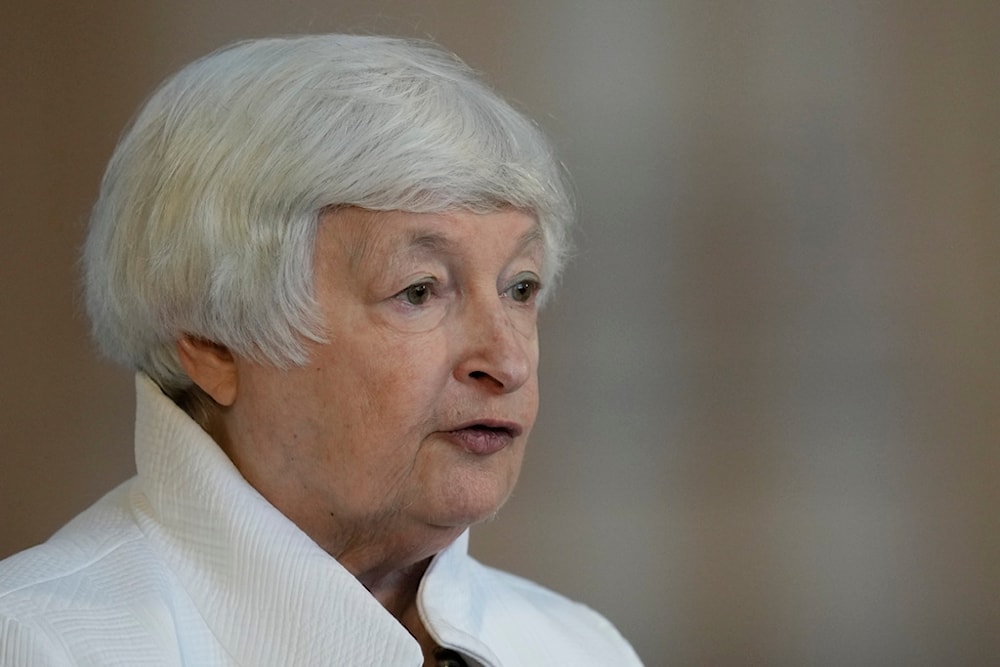Yellen says unfreezing Russia funds risks global financial stability
Despite acknowledging potential risks associated with the seizure of Russian assets, she downplayed the significance of the matter.
-

US Secretary of the Treasury Janet L. Yellen gives a press conference a day ahead of the G20 Finance Ministers and Central Bank Governors meetings in Sao Paulo, Brazil, Tuesday, Feb. 27, 2024 (AP)
At a press conference preceding the G20 ministerial meeting on Tuesday, US Treasury Secretary Janet Yellen acknowledged that the West's unfreezing of Russian assets is likely to pose a serious threat to global financial stability. Despite this acknowledgment, Yellen downplayed the significance of the matter, as reflected in her remarks.
"There are risks, the financial stability issue is a risk, and we're working to evaluate these risks and outline possible options for consideration," Yellen told reporters.
When questioned about the legal implications of actions concerning the unlocking of frozen Russian assets and their potential impact on financial stability, as well as the roles of the euro and the dollar, Yellen downplayed the potential ramifications, stating: "With respect to financial stability, I suppose a risk would arise if there were a massive shift away from currencies. But I think that is extremely unlikely, especially given the uniqueness of this situation."
She further noted that the global economy lacks viable alternatives to the financial architecture centered around the dollar, euro, and yen, and underscored the necessity for collaborative efforts within the G7 to examine different approaches with regard to the use of Russian assets.
This entails considering actions like asset seizure, alongside alternative avenues such as using them as collateral for global market borrowing.
Read more: G7 leaders pledge more Russia sanctions on 2nd Ukraine war anniversary
Approximately $300 billion in Russian securities and cash have been frozen by the EU, G7 nations, and Australia, with the majority held in the EU. While there was a belief that these funds should remain inaccessible to Russia unless it assists in Ukraine's reconstruction, there was disagreement over the legality of outright asset seizure.
To resolve this dispute, they sought guidance from a team of ten international law experts and practitioners, who unanimously affirmed in a joint letter on February 21 that the seizure of assets is entirely legal, citing Russia's ongoing special military operation in Ukraine.
"We have concluded that it would be lawful, under international law, for States which have frozen Russian State assets to take additional countermeasures against Russia, given its ongoing breach of the most fundamental rules of international law, in the form of transfers of Russian State assets as compensation for the damage that has resulted directly from Russia’s unlawful conduct," the experts in the letter, which was obtained by Bloomberg.
A day after the letter was issued to Western leaders, the International Monetary Fund (IMF) warned that plans to seize frozen Russian assets could pose a significant threat to the global monetary system and entail unforeseen risks.
On February 23, US Deputy Treasury Secretary Wally Adeyemo rebuked such risks, stating that the strength of the US economy prevents it from being undermined by the implementation of sanctions.
Global Shift Away from Dollar Dominance
The war in Ukraine, now entering its second year, has not only brought to light the ineffectiveness of Western sanctions against Russia but has also backfired on European countries that relied heavily on Russian gas.
Russia's resilience against sanctions suggests that a rapid shift to a multipolar world is in the making, especially considering that the BRICS organization has recently come to include new members, including a key US ally, Saudi Arabia.
As de-dollarization gains momentum, questions arise about the future of US economic hegemony and its implications for global economic dynamics. Discussions about the creation of an alternative financial market and reserve currency have been rapidly gaining traction recently.
Read more: New BRICS currency underway: State Duma Deputy Chairman
In a desperate attempt to try to contain Russia, the US recently introduced 500 sanctions targeting individuals and entities allegedly affiliated with Russia over the war in Ukraine. They were introduced as a result of Russian opposition politician Alexei Navalny who died on February 16.
The US blamed Russia for Navalny's death despite the fact that no evidence pointed to it. On the day of his death, US officials announced they would discuss a possible response with their allies, leading many to believe that Washington was possibly behind Navalny's death.
This also comes against the backdrop of the recent defeat of Ukrainian forces in the city of Avdiivka, which fell under Russian control, an event which highly frustrated Western countries. The fall of the Ukrainian city coupled with Russia's economic resilience has indeed driven Western leaders crazy. Even more concerning is the reality that Russia has emerged as an example for other nations in how to resist US sanctions.

 5 Min Read
5 Min Read









